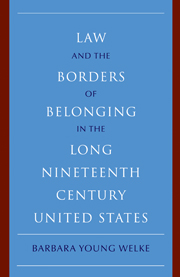Book contents
- Frontmatter
- Contents
- Acknowledgments
- Introduction
- 1 Constructing a Universal Legal Person: Able White Manhood
- 2 Subjects of Law: Disabled Persons, Racialized Others, and Women
- 3 Borders: Resistance, Defense, Structure, and Ideology
- Conclusion: Abled, Racialized, and Gendered Power in the Making of the Twentieth Century American State
- Coda
- Bibliographic Essay
- Alphabetical Bibliography
- Index
1 - Constructing a Universal Legal Person: Able White Manhood
Published online by Cambridge University Press: 05 June 2012
- Frontmatter
- Contents
- Acknowledgments
- Introduction
- 1 Constructing a Universal Legal Person: Able White Manhood
- 2 Subjects of Law: Disabled Persons, Racialized Others, and Women
- 3 Borders: Resistance, Defense, Structure, and Ideology
- Conclusion: Abled, Racialized, and Gendered Power in the Making of the Twentieth Century American State
- Coda
- Bibliographic Essay
- Alphabetical Bibliography
- Index
Summary
The space of legal privilege all too often remains unmarked altogether or is incompletely sketched, the shadows cast by particular examples of subordination. Yet as the epigraphs to this chapter suggest, able white men understood, embraced, and defended their privilege and others’ subordination. Their words provide an entry into tracing the creation, the stakes, and the borders of the legal privilege held by able white men across the full sweep of the long nineteenth century. Their privilege was both positively marked in law and constructed through the subordination, ownership, marginalization, and exclusion of disabled persons, racialized others, and women. Law made full personhood and citizenship dependent on ability, race, and gender. It gave able white men claim to the land both in positive terms and by denying others’ rights to it. Collectively, personhood, citizenship, and their claim to the land allowed able white men to see themselves as the embodiment of the nation not simply at the founding, but across the long nineteenth century.
Self-ownership and Citizenship
The American Revolution effected a dramatic political transformation — the establishment of the first modern republic — but it was fought, like the Glorious Revolution that preceded it by a century, for the rights of propertied Englishmen as men. The political theory of liberalism and republicanism on which the revolution rested assumed inequality: in fact, depended on it.
- Type
- Chapter
- Information
- Publisher: Cambridge University PressPrint publication year: 2010



